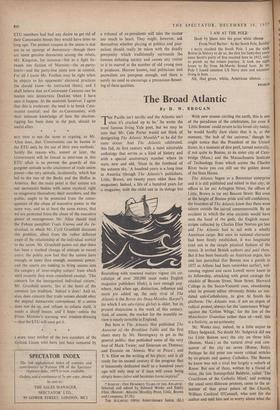BUT THIS IS not the same as arguing, as Mr.
Allen does, that 'Communists can be beaten in the ETU only by the use of their own methods.' Surely the reason why, sooner or later, the Government will be forced to intervene in this ETU affair is to prevent the growth of this gangster attitude to the attainment of trade union power—the very attitude, incidentally, which has led to the rise of the Becks and the Hoffas in America. But the main point is that unions are not sacrosanct bodies with some mystical right to misgovern themselves; their members, and the public, ought to be protected from the conse- quences of the abuse of executive power in the same way, and to at least the same extent, that we are protected from the abuse of the executive power of management. Mr. Allen should read- the Fabian• pamphlet Trade Unions and the In- dividual, in which Mr. Cyril Grunfield discusses this problem, albeit from the rather different angle of the relationship of the individual worker to the union. Mr. Grunfield points out that there has been a marked change of attitude in recent years; the public now feel that the unions have enough, or more than enough, economic power, and the courts are tending to bring unions into the category of 'over-mighty subject' from which until recently they were considered exempt. 'This concern for the 'unorganised individual citizen,' Mr. Grunfield asserts, 'lies at the heart of the common law tradition.' Indeed it does! And so,' also; does concern that trade unions should obey the normal demodatic conventions. If a union does not do so, and refuses to reform itself, it' needs a sharp lesson; and I hope—unless the Prime Minister's warning was window-dressing —that the ETU will-soon get it.


































 Previous page
Previous page